#it's like he is breaking free from the narrative which is what his existence is about!
Text
I love rereading retrace 33: echo of noise, like, you have no idea how many times I've reread it now.
Something that always gets me is this interaction:
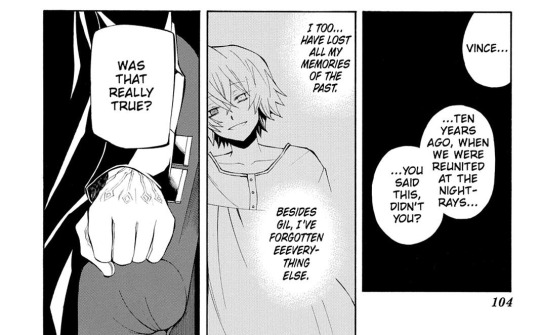
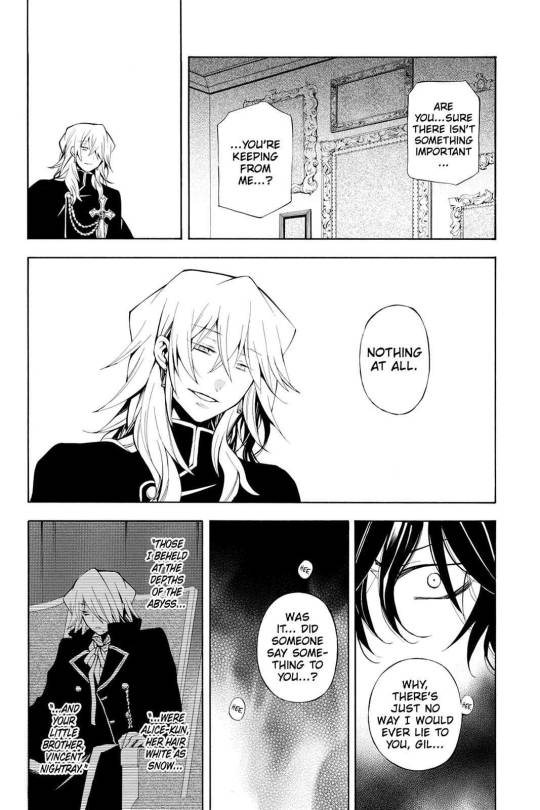
Because it's such a good example on how Vincent is portrayed as the villain - by Jun and by himself - while if you return to it later it turns out it was just deception. Just... man, the way Gilbert's question ends with "Is there something important you're keeping from me?" and Vincent answering "no" because from how he sees it, there really isn't anything important he's hiding... Like, the thing he's hiding is just how bad of an influence Vincent had on Gilbert's life (according to Vincent), and he thinks that to Gilbert that wouldn't be important to know because (1) why would it be good if Gilbert remembered something so awful and (2) Vincent will undo it anyway by committing suicide in an absolute way, erasing his existence with it.
And then the way Vincent says "I wouldn't lie to you" because he's technically not lying! But he knows that this is not what Gilbert asked, I mean. Look at his face! Look at the dark background!! He takes this opportunity to make himself seem evil, so nothing would remain of him aaaugh
He makes it all come full circle: Gilbert asked a question which Vincent took a different way but aswered honestly, and now makes it seem as if he was lying ON PURPOSE
#you could interpret this other ways too i think but that's how i see it#he's so self aware#it's like he is breaking free from the narrative which is what his existence is about!#pandora hearts#vincent nightray#gilbert nightray
64 notes
·
View notes
Text
The thing is that when Cas first laid a hand on Dean in hell he was lost, and not actually because "For the first time, I feel". Cas had felt before he knew Dean. We know this because we know Cas had rebelled before. Naomi tells us Cas never did as he was told—that Cas had a "Crack in the chassis straight off the line" (something Chuck later echoes in a rage).
Cas's rebellion is far older than Dean and that rebellion is a function of what he feels. Cas just doesn't get to remember feeling. Each time he does, he's stripped of the memory of it... but subconsciously he starts to understand it as something he must keep secret.
Can I tell you something if you promise not to tell another soul?
Cas is in love with humanity, and we conflate this with Dean because Dean is the narrative heart, and the subject of Cas's greatest love, and because the concept of humanity and Dean are so deeply linked they're almost one in the same. We are not at all wrong to conflate the two, but make no mistake—Cas is in love humanity.
You misunderstand me, Dean, I’m not like you think. I was praying that you would choose to save the town.
Cas calls humanity a work of art, and the camera pans to Dean sitting on the bench beside him. Dean represents humanity. Not just as precious works of art, but also because humans get to feel. Humans don't get lobotomized for feeling. Dean encourages Cas to feel. He encourages Cas to feel by asking him to—begging him to, and by feeling for others, and by existing and deserving to be loved himself.
Dean echoes free will to Cas like a call from the wild. He's the beauty of humanity. He's the liberation and beautiful terror of choice. The reason "You always have a choice" and "There is a right and there is a wrong here, and you know it" works is because Cas already feels, already hopes, already loves.
You were gonna help me once, weren't you? You were gonna warn me about all this, before they dragged you back to Bible camp. Help me -- now. Please.
The function by which Dean gets through to Cas is through Cas's own feelings and convictions. He gets through because Cas is "not a hammer, as you say". Cas has questions. Cas has doubts.
Cas is in love with humanity, and every time he remembers it, he gets packed off to Bible Camp and he forgets. But he can remember again. What it takes is a push. What it takes is a hand reached out in the darkness. The day Cas rescued Dean from hell, two people were saved. A hand clawed out toward Cas too, breaking through his own torturous prison and offering him escape. For the first time in a long time, he felt.
Dean's importance is that he touches Cas. He makes Cas remember. And he keeps making Cas remember. Through touch, through words, through the expression of his own affection for Cas and for others. Because Dean cares, Cas cares.
#and cas is my best friend#in love with humanity#pk rewatches spn number ?#4.07#and also later episode thoughts I'm getting ahead of myself yeah what are you gonna do about it.#4.22#the very touch of you corrupts#the one who cares#dean the narrative heart#season 4#season 8#multiseason#heaven as a cult#castiels motivations
482 notes
·
View notes
Text
Much of the supernatural horror that Will has to contend with works extremely well as a metaphor for his issues -- the Upside Down is the closet, the monsters represent homophobia, his powers are as repressed as he is, yadda yadda -- and in my opinion, this makes him a relatively easy character to analyze. Being able to draw on the supernatural stuff just gives you a lot more material to work with.
Mike, though? A goddamn enigma. He’s often present when supernatural stuff is happening, but he doesn’t interact with it to anywhere near the degree that Will does, and it’s much harder to fold him into the allegory being told here without reducing him to “Will’s love interest”.
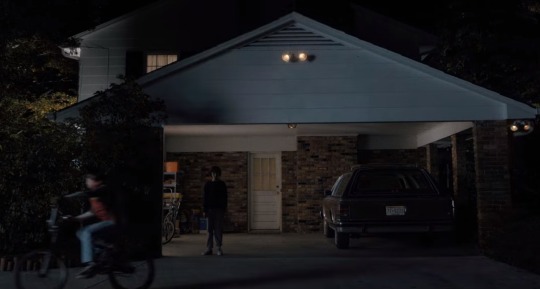
And that’s interesting, don’t you think?
That the “stereotypical” gay boy who attracts homophobes like moths to a flame has had his issues laid out in code since the beginning? Whereas the straight-passing one, who’s so deep in the closet he’s probably not even out to himself yet, is so hard to read that most of the GA assume his bizarre personality change in S3 was a symptom of bad writing?
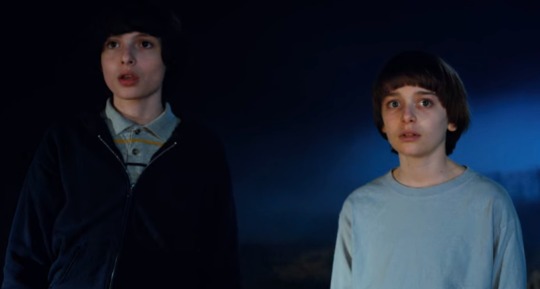
Figuring yourself out as a queer is a challenge even today, and part of the reason it’s so challenging is because heteronormativity steamrolls right over our right to know that being queer is a valid option.
The closet isn’t a queer space -- it’s a queer-shaped void within a heteronormative space.
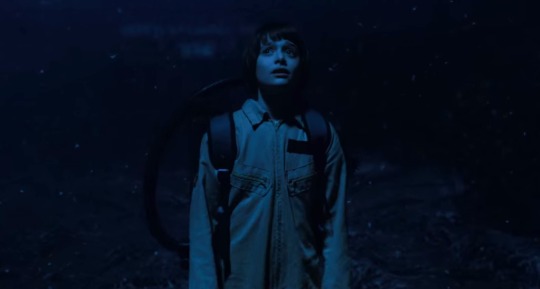
Stranger Things is full of examples of this:
Will isn’t shy about expressing his disgust at the thought of dating girls, but he’s dealing with a lot of childhood trauma so he’s just a late bloomer, right?
Will is jealous and upset about his new step-sister’s relationship with the boy he’s been attached to at the hip since he was five, but it must be because he’s in love with her or otherwise misses his platonic buddy, right?
El’s character arc is about freeing herself from toxic relationships with men, but her infatuation with the boy who puts her on a pedestal is the one exception to that, right?
Robin shows zero romantic interest in men before coming out, but she and Steve just vibe so well it’s reasonable to assume they’re love interests, right?
Vickie paused Fast Times at fifty-three minutes five seconds, but she has a boyfriend so she must be straight, right?
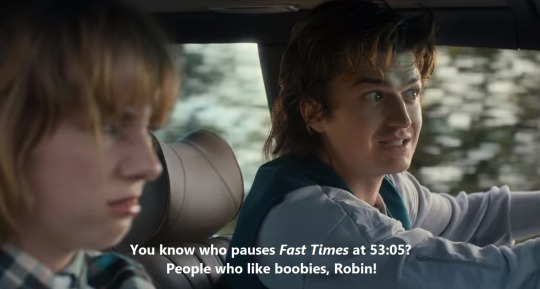
Over and over, the show presents us with an ambiguously queer situation and dares us to assume it’ll end heteronormatively.
If this were any other show I’d call it queerbaiting... but these situations just keep ending in a non-heteronormative way, all while symbolically dancing around Mike.
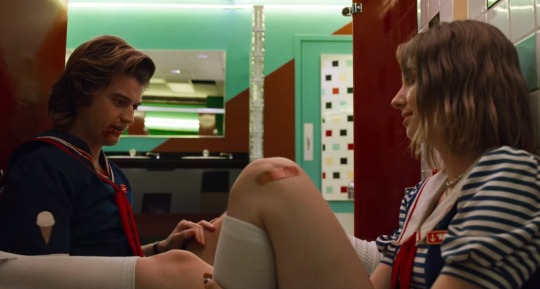
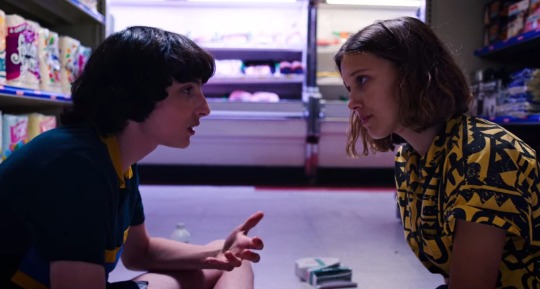
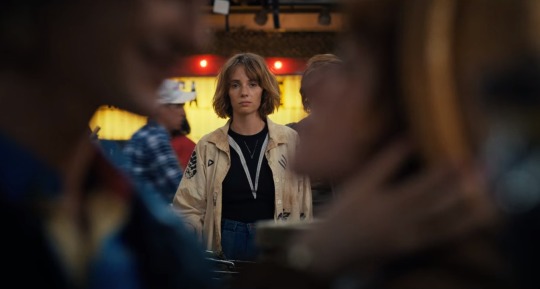
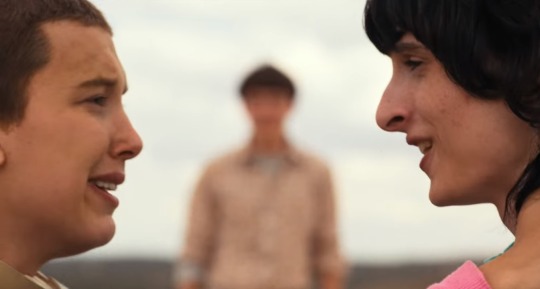
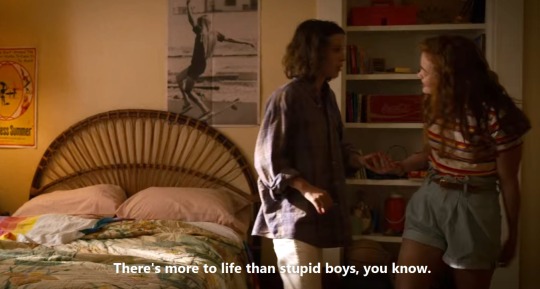
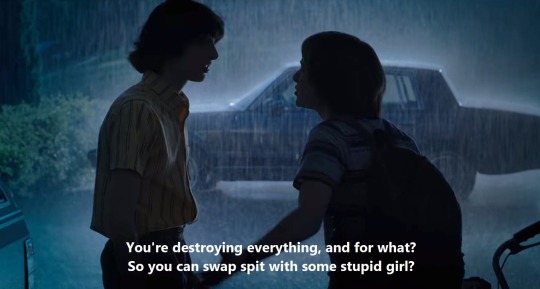
Granted, “non-heteronormative” doesn’t necessarily equal gay -- El’s arc is more about independence and forging healthy platonic relationships than about replacing men with women -- but she’s still on the path to breaking out of comphet, which is rather a queer act regardless of whether she's literally queer herself.
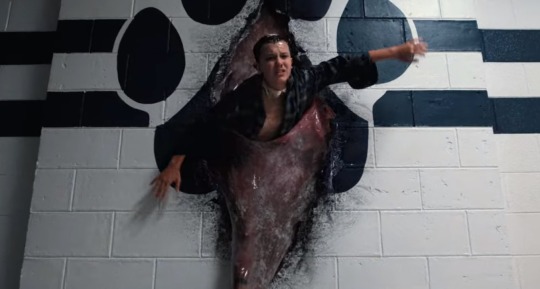
But I’m digressing.
We’ve seen how Will is visibly queer and struggles with the trauma of being abused for it, and how his closet is symbolized by the existence of a literal alternate dimension full of monsters.
But Mike is invisible, so his closet isn’t represented by a metaphor at all, but by something more meta than that -- it’s etched out in the negative space formed by the narrative itself. Only the audience can see it, and then only if we’re paying attention, tracing the edges of the story and feeling out the shape it results in.
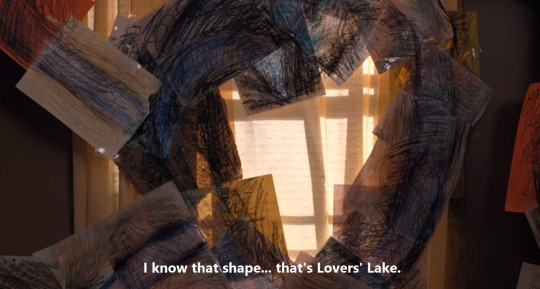
These two different approaches in depicting the struggle of being closeted remind me of drowning.
In films, drowning is a noisy and dramatic affair, easy to identify.
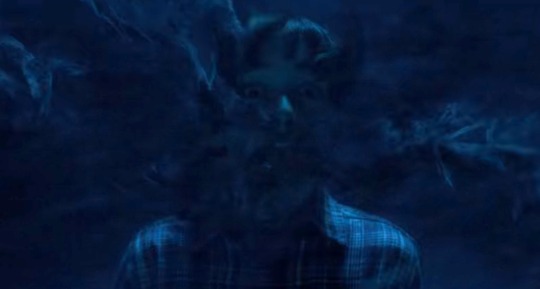
But in real life, drowning doesn’t look like what we think it does -- it’s silent and resembles calm water play. All too often, drowning victims will quietly slip under and succumb helplessly to the depths...

...right under everyone’s noses.
823 notes
·
View notes
Text
After reading this post from @waitmyturtles about her read on Fire and Dynamite, I was thinking a bit more about the way the show has handled their story and what I love about it. And I think it comes down to a crucial point: Cooking Crush, unlike most Thai bl, is NOT in the bubble, and the presence of homophobia, both internal and external, cannot be separated from their story. This is a queer narrative to the core.
Both Fire and Dynamite are shaped by their sexuality and their experiences or fear of rejection because of it. Dynamite is out and proud and unapologetic about what he wants, and as we learn when his backstory is revealed to us, this is a direct response to the familial rejection he experienced when he came out. Dy is defiant and in your face with his desires because he has already experienced the worst kind of rejection and is always bracing for more. So he dares people to do it right out of the gate. He likes to know where he stands with people, so he’d rather be his brashest self and suffer the loss early before getting attached. He deals with fear by daring people to prove him right.
Fire takes his fear in the opposite direction, denying who he is and rejecting anything that makes him think too hard about the aspects of himself he does not want to deal with. Even without Dynamite in the picture, it was clear that he was trying to talk himself into liking Jane in a way he simply did not. Once we got to know his mother, the source of his fear became crystal clear, and it was easy to see why he worked so hard to suppress himself. Fire was unhappy living that way, and Dynamite was a constant reminder of what he was trying to keep down, so it’s no wonder he reacted so viscerally to him.
But that’s exactly why their story works. Fire needed someone who he couldn’t ignore to draw out his true self, and because Dynamite is so unwilling to put up with mixed messages and half-hearted declarations, Fire had to work himself all the way out before Dy would accept him. One of the genius things this show did in their arc was have Dy pull away as soon as Fire began sending mixed signals. Dynamite was fine in the face of Fire’s firm rejection—it as what he always expected to get from him along with everyone else. But he wouldn’t allow Fire to run hot and cold on him and play with his emotions, because that was where he knew he could get really hurt. And this boundary that Dy set forced Fire to figure out what he actually wanted and communicate it clearly.
Which is why we saw Fire change so much as soon as they were together, because in the process of deciding what he wanted from Dynamite, Fire had to make some decisions about who he wanted to be and how he wanted to live. And he chose to embrace his queerness and live a more authentic life. He is a new man in this relationship because he is being himself for the first time ever, and he’s finally breaking free from the weight of his own internalized homophobia. It’s a positive change and one that is clearly making him happy, and part of him must feel grateful to Dy for pushing him into figuring out what he wanted.
But crucially, that is where Dy’s pushing ends. He is utterly unwilling to make any further demands of Fire regarding coming out, to the point that Dy puts his own friendships at risk to hide their relationship and protect Fire until he’s ready. He understands the fear of rejection Fire is still dealing with because he lived it. And he has already proven that he’s up to the task of handling Fire’s mother whenever Fire is ready to face her. These two are still early in their relationship but they have already fallen into a very natural and easy pattern of providing each other emotional support and stability, and we can see them shoring each other up. They make a great pair and theirs is a story that can only exist between queer characters.
I just love that in this show that feels so light on the surface they have made room for such depth in the storytelling. Watching Cooking Crush feels like a warm hug because even though it’s gentle and funny and often silly, there are real emotional struggles to ground us, and the story takes them seriously. We’ve seen this consistently in the main storyline with Ten and Prem, and Fire and Dynamite are no exception.
118 notes
·
View notes
Text
Mysterious Lotus Casebook and the Analogies to Being Queer
this is not breaking new grounds or anything, there seems to be broad consensus in the (tumblr) fandom that LHL is a lot about being queer. there is also this brilliant meta by @seventh-fantasy about the jianghu being a queer space, which i love, and which dealt with the gender perspective for li lianhua in particular
having that in mind, i want to say how much i love that li lianhua and fang duobing's stories feel like analogies to two different queer experiences
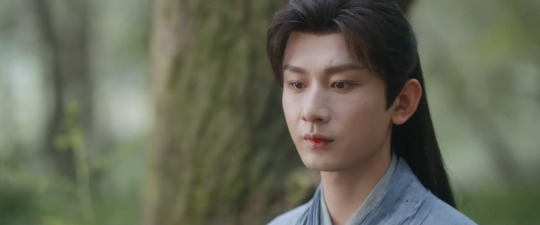
we see li xiangyi in a few flashbacks and in how others viewed him before the east sea battle 10 years ago. we know he became the n°1 swordsman in the world, established a para-judiciary system and order in an otherwise lawless jianghu, that he used to duel just to win the right to pick flowers from someone's garden as gifts for every single lady in the sigu sect, and that he dated qiao wanmian and intended to marry her (judging by that flashback where he's seen drinking with shan gudao and the boys)
a lot of it is very heteronormative, and even a bit performative. and i don't want to say it's not genuine, i actually rly like the idea that many of those actions felt perfectly real to him at the time, and i genuinely think he had that show-off streak in him when he was a teenager
but regardless, everything about li xiangyi follows the heteronormative expectations of society, including his achievements, which command, among other things, admiration for his fighting prowess and his ability to establish rules. which is of course, ironic, as pointed out in the meta referenced above, since the jianghu itself does not follow those rules (and we slowly learn in the story that there was criticism of him for this even in-story).
but then we get to li lianhua, who does not fight, but cooks, learned to sew, to plant flowers, turns down every lady who looks his way, and who does not interfere in jiang hu matters if he can help it. and in particular, we get the conversation he has with qiao wanmian in ep 18, where she confronts him about his identity and asks him:
"if you'd already come back, why did you never reunite with us?"
and his reply is:
"all of this is so far in the past, now. i'm very tired. i just want to be free."
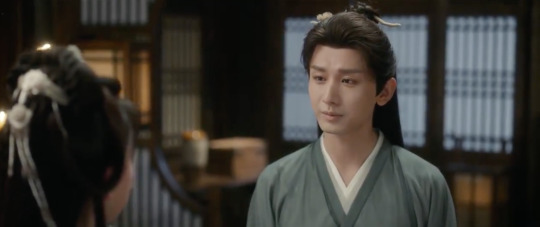
li lianhua is constantly put in contrast with li xiangyi. where li xiangyi performs, li lianhua just exists in the jianghu. where li xiangyi fulfils expectations and surpasses them, li lianhua turns his back to expectations. where li xiangyi establishes a domain and protects, li lianhua wanders freely, all by himself. where li xiangyi conforms to heteronormative standards, li lianhua doesn't.
we know that li lianhua is an unreliable narrator in that his opinion on his own past is biased, his knowledge incomplete. and he lies. almost compulsively. but there are also truth bombs that he drops between the lies. i personally believe that his willingness to detach himself from all the expectations thrown upon him and to finally exist away from norms, is part of those truths.
and this is very close to a type of queer experience, where you come out of some event or another in your twenties, suddenly realise you're queer and oh my god, it's time to live differently. and you start rejecting the norms and maybe your old friends wonder what got into you.
in the same conversation in ep 18, the following exchange happens between li lianhua and qiao wanmian:
LLH: "when we met each other, I was young and ignorant. I didn't understand what the feelings i felt for you were, either."
QWM: "what do you mean? are you saying... you never loved me?"
LLH: "back then, we were young. nothing of what we said then can still count now."
it can be interpreted in different ways, but it sure fits a queer narrative extremely well. the feelings were real, but he didn't understand whether they were romantic or not, he just followed the norms. but things are different now.
enters fang duobing
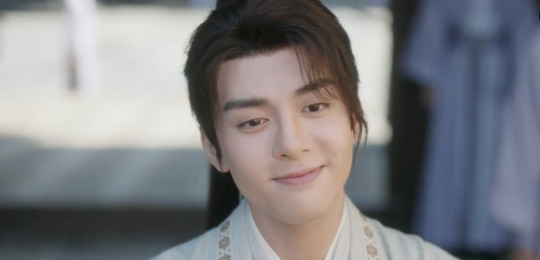
fang duobing feels like a different queer narrative. by family background, fang duobing is a person who has equal ties to the imperial court as he does to the jiang hu. the emperor and his family wants to engage him to the princess of the court, a perfectly normal thing in the societal context he lives in, and a luck few can hope to have. what does he do?
flee
i often joke that fang duobing's sexuality is to be a detective on the jianghu, but it really does feel like that kind of narrative. fang duobing never has any doubt that his place is away from the rules of the imperial court. In ep. 1, he tells his servants:
don't worry. once your young master makes a name for himself as a renown detective on the jianghu, they {his parents} will understand that, compared to the imperial court, i am much more suited for the jiang hu.
and yes, this is about escaping the rigidity of the court as such, but it's also analogous for the freedom to be who you are, to be queer, to not conform.
and fang duobing never backtracks. his parents want him to conform, and they want him to have the comfort that comes with this lifestyle. he rejects it thoroughly and consistently.
it's also interesting that in ep 25, once they meet the princess and they have gone through a case together, fang duobing still rejects the idea of the wedding. when li lianhua tells him "the jianghu is a place full of grudges and sinister schemes. why not become a carefree consort prince?"

fang duobing only looks forlorn and retorts "li lianhua, can you never say that again, please?"
in contrast, though, he has no qualms planning his whole life on the jianghu with li lianhua in ep. 15. so this is not about settling down with someone.
it feels very close to being confidently queer and knowing it from a very early age, and then rejecting the heteronormative expectations thrown upon you with assurance.
...
anyway, so what i want to say is: li lianhua is a tired millenial who discovered he was queer in his mid-twenties after a mild depression; fang duobing is a gen-z baby queer who doesn't know his queer history but is so confidently queer and he's never looking back
112 notes
·
View notes
Text
//Spoilers for Everything in AC6: Fires of Rubicon//
The Meaning of the Motif of "Borrowed Wings" and how G5 Iguazu Exists to Reinforce It
What seems to fly over everyone's heads about G5 Iguazu is that the point of his character is how 'deciding upon a goal and having the willpower to strive for it, no matter what' is literally as important as the line between life and death.
You need to find a purpose for yourself that you personally believe in. Cause no matter how grand or how petty that purpose is, if you don't have one... you die!
With whether or not you actually succeed at that goal being completely irrelevant... to your conviction for it.
(Something, something, it's the ambition that you're living for, not whether or not you get the accolades at the end.)
A moral proclaiming the importance of "deciding upon a purpose of your own free will, and then pursuing that goal no matter what setbacks you encounter" is all nice and easy when you're main character e621, who experiences no setbacks because, as the player, you're necessarily going to be strongest fighter in the galaxy.
But it's pretty obvious how trite that is on its own, where your only canonical character trait is that you always win no matter what.
And so, Iguazu's purpose narratively is to show how, beyond any ounce of doubt whatsoever, that 'winning' is not a relevant part in what makes "having a purpose" so important, or so necessary.
In essence: It's what makes Iguazu live.
Start of the Game: Volta and Iguazu both want to beat up Michigan.
- Volta gives up, and then he gets sent by Michigan to die at the Wall.
- Iguazu deserts. And he does not die at the Wall.
After Gallia Dam he send you hatemail to say that the Redguns will scale the wall, but Iguazu himself doesn't even approach the Wall after this. As G4 Volta's last words reveal, he deserts before the operation is attempted.
Iguazu *himself* watches from the sidelines, costing him no less than an almost certain death like Volta's.
And the reason Iguazu changes his mind about scaling the wall with the Redguns is because, after Gallia Dam, Iguazu decides upon his purpose. His personal conviction.
Iguazu personal goal becomes -> He wants to kill you.
We love pathetic boys.
But the reason Iguazu deserts for the sake of this new goal is specifically because he wants to become stronger than 621, and not want his obligations as part of the Redguns to get in the way of this goal of his, he goes independent.
--- Correction ---
Iguazu deserts the Redguns at Watchpoint Alpha, prior to the death of G1 Michigan. He doesn't desert the Redguns at the Wall, he only goes Away WithOut Leave. The reason for which he goes AWOL being to take independent work, as we see an example of at Grid 086. Outcomes of everything are still the same, I just mixed up the order.
Also;

Volta: "Iguazu, listen, like, Michigan really like cares about us...! It's like we're part of his family, man, just give him a chance."
Volta: *Gives Michigan a chance*
Volta: *Gets killed under the leadership of G1 Michigan*
It's really funny but sad.
It's also really funny and sad how effective at Yank-bait G1 Michigan was.
But it's illustrative of how effective it is to break down someone's expectations and feelings of self-worth to legit 0, such that empty platitudes like simply saying the right words, like the names of the expendables themselves or to bring in the medical teams after a battle (as if they wouldn't have come otherwise?), will leave such an impression that they think you really do care about them--even in despite of how worthless they obviously are~!
And all at the same time as your direct actions and orders lead them straight to their meaningless avoidable deaths.
What could be more cost-efficient for your employers than soldiers who're literally suicidal for you, right?
Ha!
--- ---
And not only does this decision directly lead to Iguazu not dying at the Wall, but, no longer squeezed under G1 Michigan's boots, G5 even directly improves as a fighter.
This is shown in how his AI differs between his fighting at the Gallia Dam--where he's overly defensive, constantly having his shield up, despite wielding two guns.
And then, later at the Grid--where he actually fights aggressively like his AC's loadout is built for.
The second major encounter with Iguazu is Watchpoint Alpha where he either fights you directly, and dies there. Or he hires Coldcall to kill you, and survives elsewhere. Again, this is an instance of Iguazu's legitimate determination towards his chosen goal directly separating him from life and death.
When he hires Coldcall, Iguazu focuses on his goal, and let's go of distractions like his personal pride and image.
Ridiculous, right? Iguazu letting go of his pride?
But consider how it's directly Iguazu's personal feelings that lead him to facing 621 personally. He doesn't *just* want to kill you in that instant, he wants the glory of killing you as well.
But the accolades at the end aren't what makes it worthy to pursue a chosen goal.
Iguazu wants 621 dead. And when he hires Coldcall, this is him coming to terms with pursuing his goal, regardless of his personal setbacks. Iguazu faces the fact that he personally wouldn't be able to kill you. And, because he comes to term with this setback, he finds an alternative method that would still lead towards fulfilling his chosen purpose.
To confirm, of course, Iguazu's purpose is really dumb and terrible. But it's not whether one's chosen purpose is 'a good goal' or not that the value of pursuing it comes from. The value comes from it being one you decided for yourself, as opposed to, for, for example, by a corporation's profits. (Not a coincidence narratively how Balam's forces, united most in their complete idolization of G1 Michigan, following *his* word no matter what even knowingly to their deaths, are the deadmost losers in the story.)
Unlike for example e621's chosen conviction, or Rusty's chosen conviction, (Also no coincidence narratively that G1 Michigan, who only exists as the weapon of his corporation and put out a bounty for his own assassination--expressing how he has no personal plans for the future and literally wants to die--is guaranteed to be taken out by either of these two, no matter what.)
It's not the loftiness of a goal that determines if it's of worth to decide upon one of your own free will and pursue it in the first place.
The 'value' of pursuing a goal is unrelated to what that goal itself is.
What makes pursuing a goal valuable, is the conviction.
You don't have to be smart. You don't have to be emotionally mature. You don't have to be a good fighter. You don't even have to be brave.
You just need to choose your purpose and follow it.
This is what the motif of 'wings' and 'borrowed wings' are all about in the story as well. It's about pursuing a goal that was chosen by someone else, versus pursuing a goal that was chosen by you yourself.
"They choose what to fight for, and take to the skies in flight."
"One cannot fly on borrowed wings" in this case literally meaning that if you pursue a goal not because you want it, but because someone else wants it, it will directly lead to your death.
Criticizing their "borrowed wings" is what Ayre and Rusty chastise the RLF for for solely repeating slogans and "not bothering to think [for themselves]."
And Iguazu, deciding he doesn't care about how he'd be seen by others, and only caring for the goal itself to be accomplished. Survives, where Coldcall dies in his place.
Coldcall, a far superior fighter to Iguazu. Dies, instead of Iguazu, because he was flying for Iguazu's purpose -> Fighting on borrowed wings.
Etc etc "this is hell, we're in hell!" and so on and in the Alea Iacta Est true ending of the game Iguazu, outta nowhere!, becomes the legit Final Boss of Armored Core 6.
How the hell did this 4th-gen AC pilot, otherwise a completely random nobody without a purpose not given to him by his employer, get to outer space and stuff, right?
Well, consider how the complete rando that was e621 does the same: Their personal conviction.
"But Iguazu only got to become the final boss out of dumb luck," right? ALLMIND chose him for little else but that he was the only old-gen Augmented Human that was still alive. If ALLMIND wasn't there, he couldn't have accomplished anything, so obviously it can't actually be meaningful.
But how would 621 have escaped Institute City without being rescued by Carla? How would we have escaped Arquebus re-education without the AC that Handler Walter secretly assembled left for us?
And, most relevantly here since this is the Alea Iacta Est route itself: How would 621 have known about V.II Snail planning to ambush you in Institute City without ALLMIND herself's very assistance?
C4-621 is, at a glance, just as much a recipient of dumb luck as Iguazu.
But thematically, it's not pure happenchance.
It's the results of the both of these characters continuing to fight for a cause they chose to believe in, no matter what.
So Iguazu survives. He survives the hijacking of Watchpoint Alpha by ALLMIND. And he even goes so far as to survive the hijacking of his own brain by ALLMIND, taking over the final boss even after being assimilated.

"What essential difference made ACs superior to unpiloted craft?"
The answer is simple -> One cannot fly on borrowed wings.
Unpiloted craft can never have a purpose that is actually their own. They exist only for the person who's wings they borrow--who's purpose they serve--who built them.
That's why piloted ACs are better. *Not* on borrowed wings, in this case, they can fly higher.
For C4-621, that chosen goal is to achieve Coral Release. (Since it's is still the mission you yourself choose that finally puts you on the Alea Iacta Est route or not, it fits within the theme of free will. Even though, as a videogame, there's an obvious limit to just *how* much free will the player is actually able to express. Within the story, however, when 621 chooses the mission to begin the path to an ending, that's them deciding for themselves 100% that's that the goal they want to achieve, no matter what.)
For Iguazu, that chosen goal is to kill you. (The goal he wants to achieve, no matter what.)
And so, because he was not flying on borrowed wings. Iguazu survives fucking everything. Stupid wings, yeah. But that just shows: What matters is only that they were his own.
Even against the most powerful super duper AI mastermind that ALLMIND was, the biggest loser on Earth, G5 Iguazu, survived.
Where even she is made to give way to Iguazu's conviction -> Killing e621.
Hammering this point home is why "I'm only here for what *I* want! I don't care about ALLMIND's goals, just my own!" is basically the only thing Iguazu says across like 2 entire 3rds of the final boss.
Iguazu's chosen goal is not ultimately successful.
But it wasn't whether or not Iguazu ultimately killed 621 in Rubicon's exosphere that lead to him not dying at the Wall like G4 Volta, or at Watchpoint Alpha like G1 Michigan and Coldcall, or upon the destruction of his physical body by ALLMIND.
It was his conviction that lead him past those things. His WINGS!
He chose what to fight for, and he fought for it.
On the wings of his free will, Iguazu flew above even the very clouds of Rubicon itself.
And that's why he was the Final Boss.
The only thing able to finally kill him being the person with a conviction even greater, C4-621.
(As a sidenote; Taking account of the main moral of Armored Core 6 really puts into perspective how many trillions of times it gets repeated explicitly across the game lol.
VS Rusty, VS Rusty when he calls you "power without a purpose," VS Cinder Carla, VS Handler Walter, Ayre's description of what the name "Raven" is literally supposed to mean, etc.
They all talk about how you've chosen your path and you'd made sacrifices to get this far and you finally have a conviction that is your own and how big a deal that is and so on.)
#tlgtw ooc#g5 iguazu#my boyfriend who hates me g5 iguazu#armored core 6#armored core 6 spoilers#alea iacta est#armored core lore#g1 michigan#it is way late at night and I am stressed out about computer problems and the only way for me to feel better#is to get as many thoughts out of my brain as possible. I'm not even really sure if this is coherent or not#but that's okay#as far as I'm concerned anyway e621's conviction is just seeing G5 Iguazu again gehehehehhehehe
129 notes
·
View notes
Text
Hi. I tend to forget that tumblr exists and just shout all my thoughts about The Winchesters on Twitter @CharCubed, which is a problem, but for once in my life I'm posting something here!
Here are some broad Thoughts on where I've landed of what this season 1 finale of The Winchesters offered–
• I very much want season 2 of this show SO badly. I want to see how they all continue to build their lives now that we know tragedy need not be their end! THIS IS THE HEALING SHOW. That whole cast gets to write their own story... "the only thing that's worse than how it starts for a hunter is how it ends" is no longer the case, as Carlos already said... and Dean helped to free them? That fucks.
• In regards to those possibilities: now that Dean would no longer be framing the prequel as a story he's telling, it frees the prequel up to no longer be doubling as Dean's story through revealing mirroring–which is very much what it's been doing for 12 episodes. Now the monster plots and the storylines for those characters in The Winchesters can also be diversified, so every episode no longer has to include, for example... [checks notes] a situation where a character is literally and/or metaphorically trapped and has to confront their trauma, break cycles of violence, and speak truths to be freed. It's been very Loud and very much Like This Constantly because it's Dean's story, but now it won't have to be anymore, which is an interesting thing to contemplate! (To be clear, for those unaware of my history of yelling about this show: I love that it was Like This. This show is fucking genius.)
• Initially, this finale had some alarm bells pinging in my brain but then I parsed the Reasons for those things. Mary told John she had "Something to say," right? And then she never says it. That's a Chekhov's gun that's never fired and it's of course paralleling how Dean has "something to say" to Cas too. Them not speaking that truth is a problem. In addition, we also got a montage eerily akin to the 15x19 one. But these callbacks / parallels to s15 all loudly indicate something very specific: The Winchesters is an unfinished story, and this finale (like the rest of this show) is mirroring and revealing truths about the prime narrative of SPN. For one thing, with the prequel they originally expected to have 22 or so episodes and ended up having 13 to work with. For another... this is the START of their story, not the end. So along those lines, what can we deduce about the end of season 15? (Hint: that finale is not an ending either.)
• Speaking of which: We learn that everything Dean was just doing takes place in the ~heavenly~ time period before Sam “dies." This all functionally happened right after Dean died as he drove down that road. He is restless, unmoored, grieving, and–this is key–considers his "ending" to be an unhappy happy one. He's fucking around and finding out, looking for and unpacking (through his narration) what he needs and wants for HIS happy ending to look like. He found out about the Akrida being a failsafe from Chuck and couldn't resist meddling to save everyone. It's also worth noting that Dean says to Jack something like, "If you have to kick me out of Heaven then that's fine." Between the lines is the thought of "please kick me out of Heaven, I'm causing problems because I'm grieving and I'm not done, I don't want this 'peace' but would rather have freedom." That in itself is a massive subversion of the SPN finale, to say nothing of the previous 12 episodes we've received.
Anyway. So in terms of Dean's story, we now know that this all takes place smack in the middle of 15x20 timeline-wise. This checks out because Bobby's presence connects to him being the only one we saw in 15x20. And... what I personally consider to be Jack's incredibly fucked up or ~potentially taken over by Chuck~ vibes are, in that sense, consistent with 15x19 as well. (I'm so sorry but please let me drop this cursed "Alex Calvert playing Chuck" joke by Jensen from August 2022 which haunts me.)
So: nothing about the concept that @chuckwon at the end of season 15 has been confirmed or denied in canon at this point. The idea that Chuck LOST, as Dean says here, is simply what Dean may still be thinking (which makes sense). But nothing has fundamentally changed about the state of how season 15 left things in the prime narrative yet... largely because that's not what this story is / was about.
In terms of what this finale presented to us, I think "Chuck won" potential was all deliberately left open. And I continue to Call Bullshit on the finale accordingly. A Chuck won plot line COULD be used in a future sequel to great affect, or it could NOT be used in a future sequel. That will be totally up to the future authors / team behind that potential sequel to see what story they choose to tell, and where it all may or may not go. But until then (on that front) right now it's the same shit, different show, and deliberately literally nothing about that potential has changed.
• I LOVE all of the above now that I've parsed it all in my brain. It makes perfect sense. Much like we were never going see the gay angel pop up in this show and kiss Dean (with apologies to anyone who somehow thought otherwise?)... leaving other things open like this is fantastic and the objectively correct call. Dean's story is HIS story to be furthered elsewhere, whereas this show belonged and continues to belong to its cast of characters who must take center stage. But through this story within a story narrated by Dean himself, we learned a hell of a lot about his state of mind as it actively stands in 15x20. Or more accurately: the entire show reinforces and reiterates comprehensively and repeatedly that the SPN finale was wrong and bad and not the end of the story at all, and now canonically and openly and in no uncertain terms that that's how Dean feels too.
• AND THUS: season 1 of The Winchesters works as deeply clever and layered commentary on Supernatural's ending and presents the stepping stone for a sequel continuation for Dean and his family. It's also the beginning of a new chapter with endless potential for The Winchesters' cast of characters who are not tied to fate or main timeline.
I fucking love it here.
Truly, madly, deeply: ALL HAIL ROBBIE THOMPSON.
And seriously, I really hope we get a season 2 because I adore all of the prequel's characters on their own merit and I want to see what their story can become :')
#the winchesters#spnwin#spnwin meta#the winchesters meta#dean winchester#GO LITTLE ROCKSTAR. FUCK SHIT UP#chuck won theory#chuck won meta#char writes things#ON TUMBLR? NO WAY.#I will likely reblog this to the chuckwon blog eventually
218 notes
·
View notes
Note
Hi!!!
I haven’t even fully watched Last Twilight (I think I’m on episode 2 lol) but I’ve kept up with all the gifs and metas and let me say I am ANGRY at Day after the snippets I’ve gotten on tumblr about breaking up with Mhork. I hope they don’t get back together in episode 12 because let’s be real, that boy deserves better!!! I hope Day realizes his mistake but it’s too late because he hurt Mhork so deeply. Mhork literally gave Day his heart and soul and explained all of his raw trauma and then Day threw it on the ground and stomped on it just because of his own insecurities!!! I’m so angry I don’t think I’m going to enjoy actually watching the show because I’m just going to be glaring at Day the whole time. I hope Mhork goes to Hawaii and finds happiness and Day reflects on his life 😤
-MA
MA, I can't encourage you to finish it or not. That's not my style. But I know Aof deserves my watch. He has given me great show after great show and all have featured excellent queer stories. Not only has he written some of these shows, he has directed them as well as produced even more!
I respect Aof.
Which is why even though Only Friends is in Petty Prison and I hated it unlike others who greatly enjoyed it, I finished it because Jojo, much like Aof, has given me so many other great watching experiences like The Warp Effect and 3 Will Be Free. Because what is one bad moment in the grand scheme of Jojo's career or Aof's outstanding career?
And here is the other thing:
I hated Bad Buddy.
Which was also from Aof. I hated it while watching it when Pat was shot on Christmas Eve. I hated when it was done because of that "breakup" at the end of episode 11 and the continued ruse in episode 12 even though the audience had been in on all their shenanigans up until that point. I hated that it was paired with Aof's masterpiece A Tale of Thousand Stars in the Our Skyy installments just so I would have to see Pat and Pran keep pretending they weren't in a relationship even they were actively watching a queer couple breaking up. And I'll always hate it.
But the crowd loved it.
So . . . I believe the crowd is going to love the ending of Last Twilight too while I'm still chilling here six years from now mad about the ending of episode 11 since I'm petty.
I hold grudges and water them daily like plants in a garden. Be My Favorite forgave Knot even though he was awful every second of his screen time. *points hose in its direction* Teh stayed messing up in I Told Sunset About You then had the audacity to cheat in I Promised You the Moon. *blasts some water in its direction* Team needed therapy in Between Us not sex. *turns sprinkler on* HIStory 3: Make Our Days Count exists. *dumps a bucket of water on the ground*
Perhaps wait until the last episode has aired and check the tags. I assure you there will be plenty of people who love it. They will be singing the shows praises and how amazing the narrative was. People will be laughing about how we even questioned the genius of the show after this episode instead of trusting the process.
But as for me, hopefully Night and Phojai are getting married and the simple fact that I am rooting harder for the hets in a BL finale should tell y'all all you need to know about my petty ass.
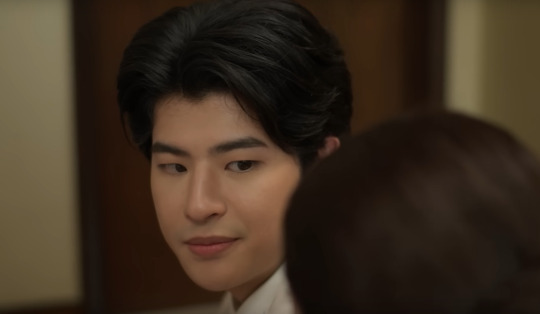

Now excuse me as I need to go start digging a little hole for the newest addition in my Grudge Garden.
#Last Twilight#Last Twilight the series#y'all are going to love the ending#I'm sure of it#Jimmy and Sea acted their butts off#and the story was good#but if there is one thing about me?#I'm gonna STAY petty
44 notes
·
View notes
Text
Connections between Gods of Stories: Breaking the Cycle and Rewriting Reality
From "Loki God of Stories - A Comparison between MCU and Comics" series - Co-Written by @lucianalight (Luci) and @theitcharchives (Hollow)
Ouroboros, the snake that devours its own tail, is an ancient symbol of birth and rebirth in a never ending cycle for eternity. It appears in many mythologies around the world including Norse mythology, with the serpent Jörmungandr encircling the world with its tail in its mouth.
Like an ouroboros, Loki is trapped repeating certain moments again and again, but no matter what he tries, the outcome doesn’t change. In the comics, it’s him trying to escape the role of villain and Ragnarok. In the series, it’s him trying to find other ways besides killing Sylvie and saving the tyrant who takes away everyone’s free will in exchange for constrained stability, or letting everyone decide and allow the basis for a multiversal war. There is also a nice parallel between comics and MCU here. In comics kid Loki wanted Loki to choose his path aka die as himself. Classic Loki wanted him to choose the old role. And in MCU Loki could either die with the destruction of all universes or kill Sylvie and become a villain. It's a recurring cycle in both mcu and comics. Loki either dies a hero or has some scheme(betrayal, escape, etc).
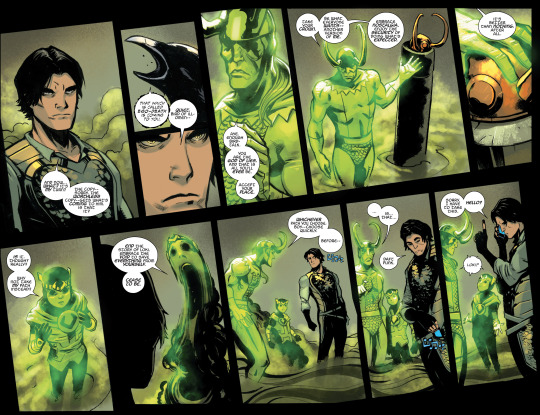
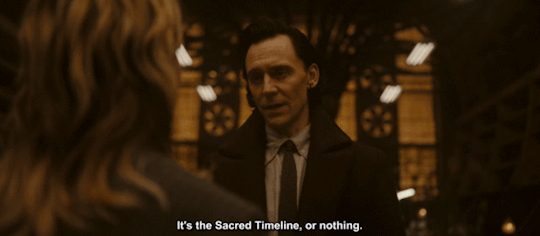
But series Loki doesn’t like either option. So he finds another way, like comics Loki. For the people he loves, for everyone, and for himself. And I (=Luci) can’t help but think that “For you, for all of us” in a way is breaking the fourth wall. Loki’s also saying it to us who love him and followed his story all these years.

“It’s not your story. It never was.” [Renslayer, S1E1]
When Loki asks “how does it all end?”, Mobius answers: “It’s a work in progress...They’re untangling the epilogue from its infinite branches.” Not far from the truth, actually. There was a point after which HWR couldn’t predict anymore what would happen: it was Loki time slipping, again and again, until he made the final decision of replacing the equation. The end wouldn’t be clear before Loki arrives in the TVA and before he starts his Journey from there in season 2. The multiverse fate depended on the decision he would take in the future.
Each time Like time slips, the cycle repeats:
Sylvie kills HWR
The loom overloads and deletes branches except scared timeline which causes HWR's reincarnation(Remember while Loki does remember all his time slippings HWR doesn’t)
in sacred timeline Loki escapes with the Tesseract
TVA gets him until he reaches HWR’s citadel with Sylvie
return to number 1,
until Loki destroys the loom and creates the tree and the loop(1 to 4 repetition) breaks.
So the cycle starts with Loki getting to the TVA until it breaks with Loki always keeping the timelines alive. It is a dynamic similar to what happens in Sandman S1E11, A Dream of a thousand cats. When the cat asks Dream of the Endless if a world dominated by humans and not cats was the actual reality, Dream replied that it had always been so once the humans dreamed of it. So the narrative strand of the cats’ world and of the humans’ world can exist in parallel, as HWR’s reign and Loki’s reign do–there was always a sacred timeline, until Loki replaced it with Yggdrasil that always existed (which is why Doctor Strange was able to see billions of outcomes in IW).
So now, there are two parallel narratives, one where time was always constrained into the sacred timeline which led to the happenings of the season one and two, and one where Loki has always sat in Yggdrasil and held the timelines. The first narrative has always been true, until Loki disrupted it, and now the second narrative has always been true (like the humans dream-changing the world as it has always been).
This needs to be true for both the beginning and the end of the series to exist. So Loki substituting the narrative is him reshaping reality, retelling the story of the universe. Which makes him this universe's God of Stories. Even God of the Story, if we consider his Yggdrasil the creation myth that spawns all others.
There were other examples of the loop too, most notably Ouroboros himself. Was OB inspired by Timely or vice versa? Who came up with that knowledge first? Who was there first? HWR, Timely or OB?(It is my personal idea that this very thing was what actually led to OB being named like that, and the Ouroboros parallels are Luci’s mind connecting dots -Hollow)
This is how comics Loki defeats the gods sitting above in the shadows. Did the gods create humans, or did the humans create their gods? What about gods of gods? Who created who first? It's a never ending loop. A never-ending story. Just like how Loki’s story was cycling in a loop.
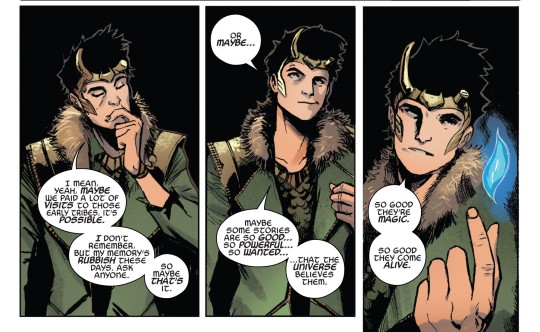
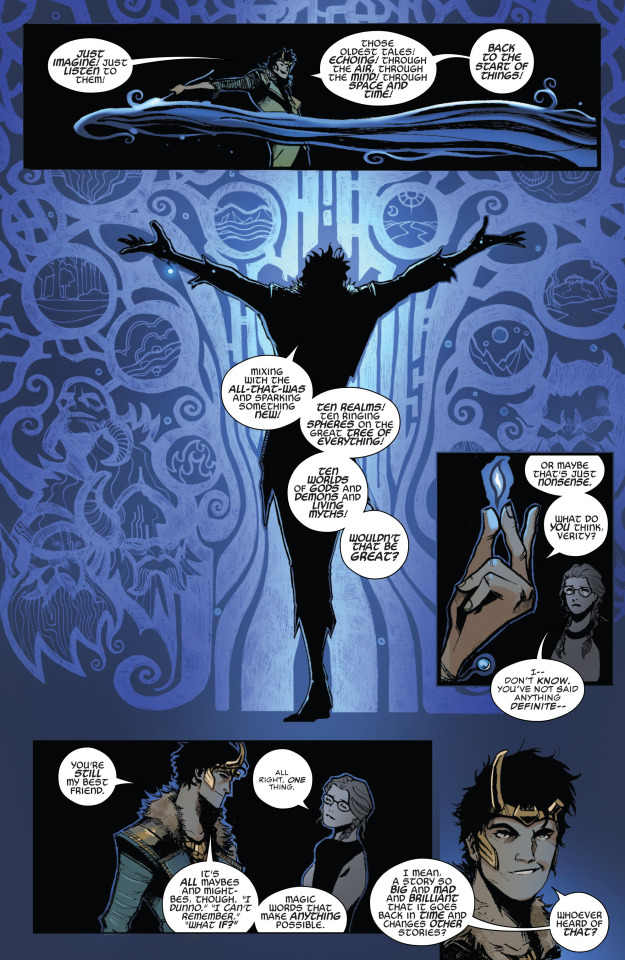
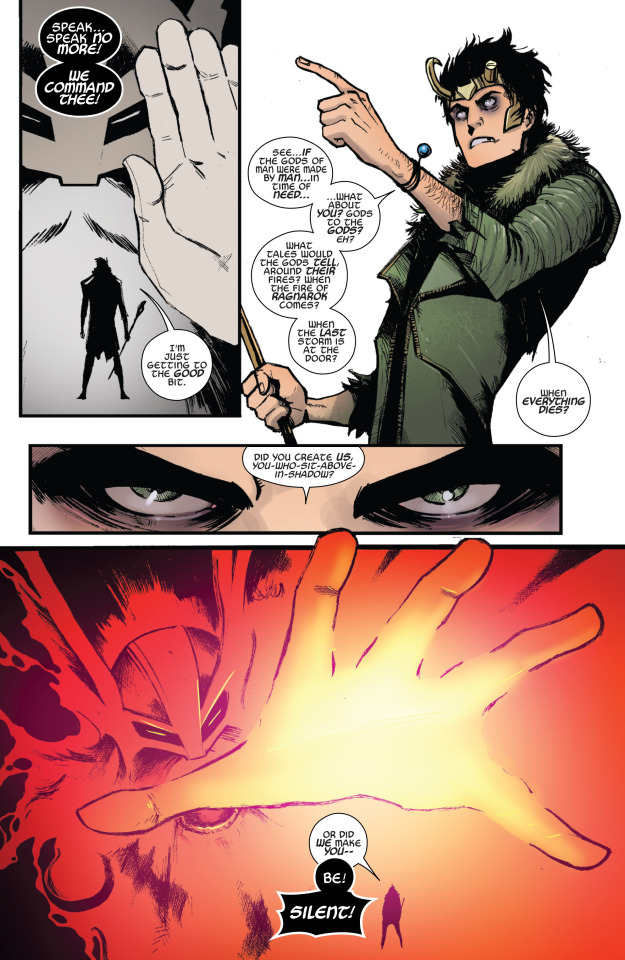
From the ancient Egyptian to now “the loop – so often represented by the ouroboros – has been inextricably bound to our concept of time.”[s]
I (=Luci) have to appreciate how the series keeps the theme and lore through both seasons and connects it to the ouroboros mythology. The sacred timeline is shown as a circle surrounding the HWR’s castle. “The ouroboros in its original Egyptian context symbolizes repetition, renewal, and the eternal cycle of time.”[s] And when HWR is talking about managing the timeline it is shown as a circle around him. Like how “In the more widespread Roman variant of Iranian Mithraism, Zurvan, symbolizing ‘boundless time’, is depicted with an ouroboros entwined around his body.”[s]
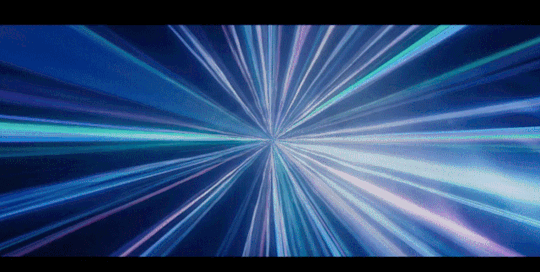
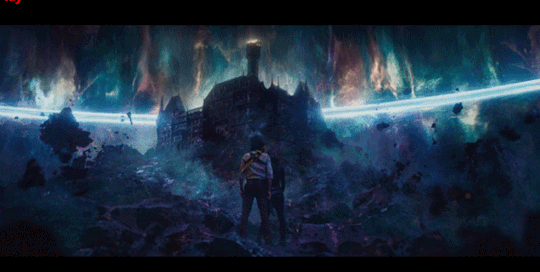
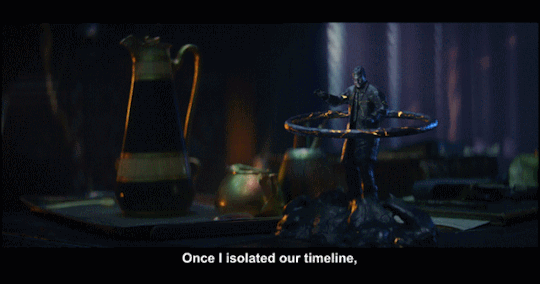
“The Renaissance-era alchemists saw the ouroboros as something to break out of in pursuit of a linear, rather than cyclical, eternity”.[s] When Loki breaks the cycle by becoming the god of stories, the timelines shape Yaggardsil, tree of life. A tree of stories just like how comics showed the stories as a tree.
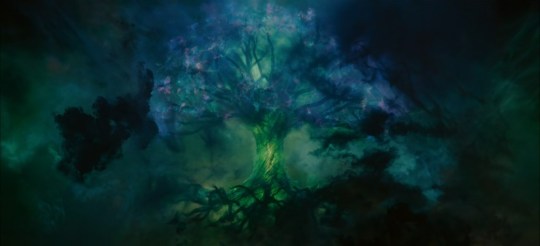
The existence of everyone’s stories depended on him. Loki became the god of stories by giving everyone the chance to write their own stories. The story was always about him. For all time, always.
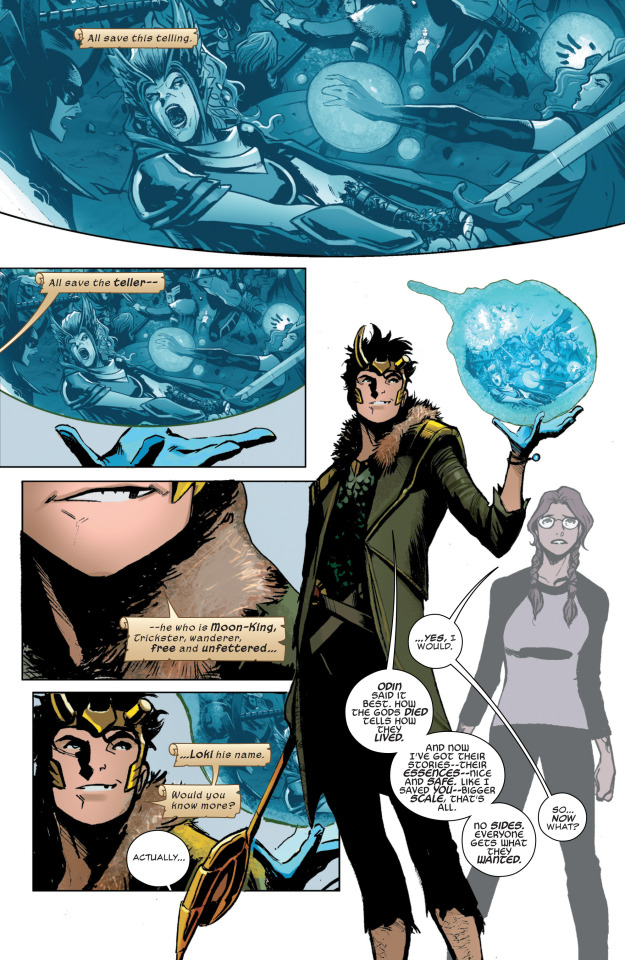
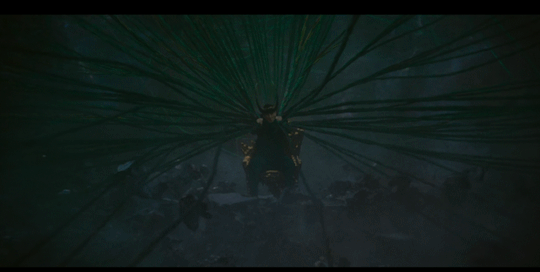
Source: The ancient symbol that spanned millennia
Previous - Next
26 notes
·
View notes
Note
i am kindly asking you to please elaborate your discussion about dan heng's past bcos it's really interesting
Oh bestie buckle up then-
Dan Heng's past is very complicated. If we only go from the character stories from Dan Heng's character screen we get to know that he was on the run since as long as he can remember - and that he was essentially born in prison - That is the past that Dan Heng REMEMBERS.
But if we want to dig deeper, we go to inner turmoils and dipping down the very essence of Vidyadhara's - which is the route I'm going here.
Here's an overview that I'm going to go explain about Dan Heng's character as a whole:
An explanation of the short animation: "Ichor of Two Dragons" which can further explain the last point below:
Dan Feng and how Dan Heng is a continuation of Dan Feng. As in: Dan Feng is Dan Heng's past, but Dan Heng is Dan Feng's future.
literally settle down and grab some water while you read through i'm pretty darn sure this is going to be a long one although i'll try to just say the main points - if there are anything within this post that confuses you do ask me and i'll elaborate further!
A few things you should know before continuing: I will most likely mention leaks and I will talk about religion (buddhism in particular) So this is in no way spoiler free so read with own caution, thank u <3
I hope we can all agree on the fact that Dan Heng is a chinese character with heavy buddhist themes. As such I do want you to read through this post with that thought at the back of your mind (speaking from a buddhist myself, the way how hoyoverse incorporated the various aspects of it with the Vidyadhara and to that extent, Dan Heng is very beautiful)
As such, the saying that: "Dan Heng and Dan Feng are the exact same person." and "Dan Heng and Dan Feng are two completely different people," are takes that misses the point of his entire story and thus also downgrades his final resolution as well.
That will be all from what I personally want you do to, enjoy the rest of this HAHA
1. Explanation of the animated short: "Ichor of Two Dragons"
The animation starts off with the High Cloud Quintet drinking together, this is inherently Dan Feng's memory re-experienced by Dan Heng. This memory is something he actually accepts without complaint, even smiling like he's personally there experiencing it.
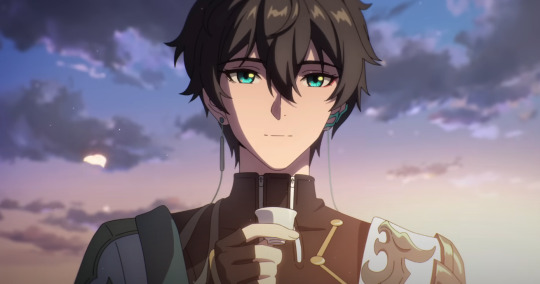
Conflict however soon breaks out between Dan Heng and Dan Feng - which marks the start of Dan Heng's internal conflict - thus all of his fears, traums and doubts resurface in the form of his past self.
NOTE HOWEVER: that the Dan Feng portrayed throughout this entire animation isn't actually Dan Feng. It is instead a reflection of Dan Heng's own thoughts and beliefs that causes him inner turmoil.
It's not meant to be interpreted as a literal battle against Dan Heng and Dan Feng.
Everything that "Dan Feng" says up till the point where they clash are Dan Heng's own thoughts and what he's been taught to believe since his rebirth in the Shackling Prison - where he was subjected to indoctrination about Dan Feng, his past life's sin and the punishment he must bear.
Which also in hindsight does tell a LOT about how Dan Heng himself perceives Dan Feng: An arrogant and unfeeling person - and thus is so different from himself. Dan Feng is to Dan Heng the very reason everything bad has happened to him in his life, and as a result fiercely wants to detach himself from him.
It's understandable really, when you were taught that your very existence is a sin in itself because of the narrative surrounding Dan Feng is that of a villain - and then your very own identity feels threatened because it's associated with said "vilain."

This line in particular tells a lot about how Dan Heng is very much aware that he can't keep running. It's a reflection of the harsh truth that Dan Heng himself is aware of. Joining the express while not having a clear aim or destination of his own is never a permament solution for his desire to escape the past.
Speaking of said clash, a direct fight doesn't happen before Dan Heng asserts the fact he is not Dan Feng.

This is the obvious instance that Dan Heng rejects an integral part of himself, and it's the very same rejection to said identity that generates both chaos, conflict and inner turmoil that takes the form of a fight. A fight that goes on until Dan Heng eventually gets submerged by Dan Feng's waters and the dragon after he's told he has nowhere to run.
"Nowhere to run" is mentioned a lot throughout Dan Heng's story. The saying itself is a reference to Dan Heng's karma that he refuses to confront the consequences of. Karma in this instant is something that transcends the cycle of rebirth (samsara) and in thus reflected in the line of "a past life's sin must be repaid in this one"
NOW. A LOT OF PEOPLE DON'T LIKE THE LAST SENTENCE. CAUSE HE'S A NEW PERSON, WHY MUST HE REPAY HIS PAST INCARNATIONS' SIN IF HE HIMSELF DIDN'T DO IT?
Let me tell you! From the perspective of a buddhist!
In modern times, the usage of the word karma has really wilted down to saying that "Karma will come back to bite your ass" etc. In a way saying that if you don't try to fix a fuck up that you did recently, you would get consequences for it later DOWN THE ROAD.
Meanwhile, in buddhist tradition, karma refers to actions driven by intention. Samsara and karma are so intregrated that the karmic intentions and accumulations of the actions you've done in one life wil be the determining factor in what kind of rebirth you will have in the next life.
Karma will come to bite you in the ass yes, but especially in your next lifetime if you continue doing actions with ill intent - going as far to being the one determining factor if you're gonna live a peaceful, nice life or be reborn as a bug.
Why should that matter, you ask?
You remember Blade telling Dan Heng that he has NEVER experienced death? Because it is indeed true. The Vidyadhara molts themeslves to essentially fix their bodies and enter a new rebirth cycle - as such, avoiding death.
It's a different body, but the soul - their essence is still the same.
I'll come back more to this later, but for now let's continue explaining the animation.
It's ONLY when Dan Heng asserts the fact that Dan Feng is right that a change happpens. In the english translation given he says: "You're right. You are my past, but you won't follow me into my future!" it's only when he accepts that fact that he's able to stop being suffocated by the water - even embracing the same thing that tried to drown him and using it as his own power, able to manipulate it and even turn the dragon back on its first caster.

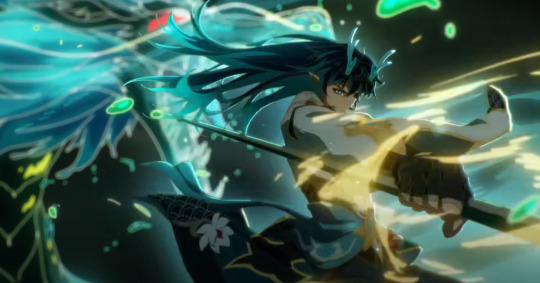
Now, the most vital part (and also in my opinion, the most beautiful one) is the fact that the fight doesn't end with Dan Heng striking down Dan Feng.
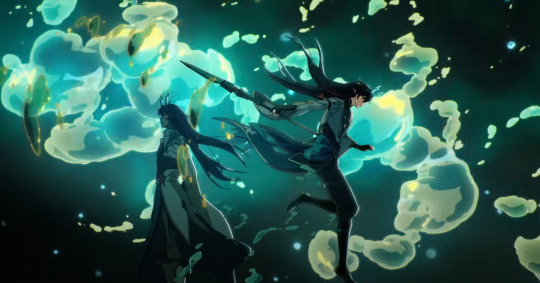

It ends with Dan Heng passing by Dan Feng and dispersing the dragon into rain instead. It ends with Dan Heng accepting that past. Accepting Dan Feng as a part of himself.
Now, a thing I realized with the english translation is that it goes a different way than what both the chinese voice and jp dub had said. I listen to the JP dub, and I do have better listening comprehension to the spoken language than written. While the english version goes with the: "You are my past, but you won't follow me into my future!"
Both the chinese version and jp version says something more akin to: "You are my past, but you are by no means my future!" It's slightly the same, but this final resolution said in that way instead holds a lot more weight and nuance.
The fight starts with Dan Heng rejecting Dan Feng, but ends with the opposite. Dan Heng is accepting that yes, he was once Dan Feng - but he's not going to let that define him entirely as a person or let that define his future entirely.

Another difference in translation that english has compared to the jp dub that I noticed (can't speak for chinese voice here) is the ending with Welt, March and the trailblazer appearance.
While ENG Welt asks if Dan Heng is alright. The JP version rather asks: "Did you remember something?"
In ENG, Dan Heng responds the question with: "Mm. Just reminiscing," in JP, he answers something along the lines of: "Something from long ago."
(i would like to also point out that march noticed him smiling and wasn't just like: "GIVE ME A SMILE!" out of nowhere to ease him, but more like: "Oh you're smiling! How rare, hey do it one more time!") ( ´ ▽ ` ).。o♡ oh my dear express family.
In a way, phrasing a memory from your past self in that way just holds a lot more weight with Dan Heng's acceptance of his past, by referring to Dan Feng's memories as memories from long ago rather than labeling it as something separate.
In conclusion, the animated short is only the start of Dan Heng's story (as I very much hoped it would be) and not a conclusion. With this animation, it has established Dan Heng's goal as a character and sets the stage for the future of his character (AND THUS MORE DEVELOPMENT YEEHAW!) It's a great starting point for Dan Heng to find a way to reconcile the past and the present to finally be able to face his future.
2. Dan Feng and how Dan Heng is a continuation of Dan Feng. As in: Dan Feng is Dan Heng's past, but Dan Heng is Dan Feng's future.
Now, here is where some leaks actually comes in (Moreso one leak of Jingliu's voicelines-)
Remember how I mentioned earlier that we would come back to the essence of the soul and how Vidyadhara have different bodies after every rebirth, but the same soul. Yeah, WE ARE BACK TO THAT AGAIN TOO!
The clash between Dan Feng and Dan Heng in the short animation wsa an emotional one, it was a clash between Dan Heng and his inner turmoil that essentially ended with no true winner. Rather it showed Dan Heng's slow acceptrance with coming in terms with his own past and accepting continous nature of his identity.
Because if you look at it this way with the knowledge that the same Vidyadhara will forever bear the same soul - Dan Heng would be considered the cumulative result of all his past lives and his current one.
There is a continuity of identity as it undergoes the cycle of rebirth, where each new incarnation is an augmentation of the previous one. As such, in the world of Star Rail, identity is not fixed, but fluid. It changes, but it's still the same soul from the very first one.
The new identity changes and evolves with each incarnation, with information by the experiences of the previous one. Most Vidyadhara have belongings that their previous incarnation have left behind, notes left behind them - and the few I've met in the open world of Star Rail do also come to love whatever their previous incarnation loved.
And as mentioned in an older post (that i'm way too lazy to dig up at this point lmfao) A newborn Vidyadhara usually gets pardoned the sins of their past life - but Dan Heng is a special case because of the emphasis of a FLAWED rebirth - as such he more than anyone have gotten the treatment of a life's past sins must be repaid in this one because his very essence and soul is closer to a continuity of his past one than other Vidyadhara.
Again, I desperately want you all to view this through the lens of a buddhist and understand that Dan Heng is written from an asian perspective. The complexity of karma and samsara in buddhism is the fact that it's flexible, fluid and a dynamic process - There is no set linear relationship between an action done and its result. The effect of the deed is not solely determined by the deed itself as well - but rather by the nature of the person who commited the deed and by the circumstances in which it is committed.
Because Karma in itself is not a judgement imposed by some God, we don't believe in a god after all. It is instead the results of a natural process, a result of certain experiences in life which were the results of previous actions. Unjust behaviour can lead to unfavorable circumstances which makes it easier for the person to commit more unjust behaviour, but again. You're free to commit more unjust behaviour, but you're also free to not do so.
Which means that the journey of the soul isn't linear by all means, it's cyclical with each end of one being the beginning of the next cycle: The result of what happened in one life becomes the starting point for the next life.

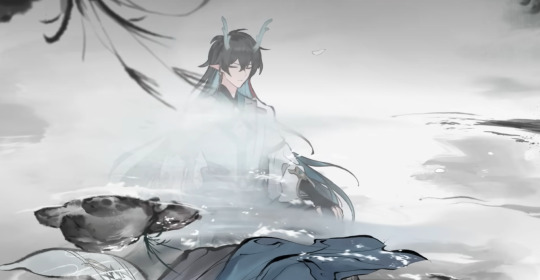
Dan Heng's major character points is the struggle of identity. And the character stories from his IL form shows the evident struggle with identity again - Mind you, these character stories for Dan Heng: Imbibitor Lunae are just a recollection of important point in Dan Feng's life being dreamt about when he was forced through rebirth)

Jingliu's leaked voiceline about Dan Feng gives us the confirmation that to become the High Elder means losing your own identity to a certain degree - even to the point that your very physical appearance morphs to resemble the Primordial Imbibitor Lunae (the very first one)

I want to preface as to where we stand as of right now, the current perception of Dan Feng is of an unfeeling, aloof and arrogant person. Someone who caused suffering to his next reincarnation - But by doing Dan Heng's companion quest alone it raises so many arguments that's so far from the truth. (HECK EVEN BAILU MANAGES TO SEE THAT DAN FENG COULD'VE BEEN A GENTLE PERSON)
Because as much as the fandom want Dan Heng to be separated from Dan Feng because he's his own person, it wouldn't be wrong to assume that Dan Feng yearned freedom too, no?
What if Dan Feng also yearned for freedoom amongst the stars, maybe the reason why Dan Feng severed the High Elder succession like he did - maybe he wanted his future selves to not be bound by the same shackles like he was? It wouldn't be farfetched, right?
Dan Feng is indeed Dan Heng's past. His memories, experiences, abilities, powers and EVEN PERSONAL items were once Dan Feng's. It is now Dan Heng's, but again. Dan Heng was once Dan Feng too.
As such, Dan Heng is Dan Feng's future - a future where he's able to attain the freedom he wanted.
ANYWAYS. I FRIED MY BRAIN CAUSE I WROTE 80% OF THIS IN ONE SETTING, SOME THINGS PROBABLY DOES'T MAKE SENSE AT ALL BUT YEAH! DO ASK IN THE ASKBOX AS I'VE SAID BEFORE. IF YA READ THIS FAR AND STILL RETAIN YOUR BRAINCELLS THAN WOW
I APPLAUD YOU HAHA
#narus' message corner#anon#this took more time than it should've because i procastinated im so sorry anon#but i hope ya'll enjoy#again next few updates can prove me wrong but like#from reading and rewatching the short animation and the other animation numerous times#i just lean more into this more than anything#i hope it wasn't too personalized either#i really try to not be subjective in these sort of analysises after all HAHA#dan heng#honkai star rail
42 notes
·
View notes
Text
Chapter 85
Now that I'm not mentally hungover from watching a certain 3 hour movie that released recently directly after reading the chapter, here's a longer post on chapter 85.
Just to preface this - this is just my theory, and there are some pretty big ifs here, so I could big wrong about this. Also I put forth some negative opinions for Nightfall towards the end, so hardcore fans of her may want to skip this post.
As I mentioned in an earlier post, I think Nightfall is going to be out of the picture for a while after this arc. However, I think the are a few more reasons why this makes sense for the narrative than just her injuries.
Endo just introduced a new named female character: Chloe ( I'll admit this is possibly my weakest point on this)
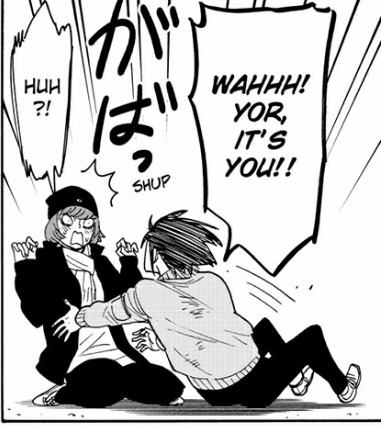
By ushering out Nightfall for a bit, Endo frees up some space explore her character and her relationship with Yuri. While he could have done this with Nightfall around, people do tend to get annoyed if too many chapters go by between major arcs and Nightfall leaving for a bit will allow Chloe to take the chapter slots that Nightfall normally would have taken while Endo establishes Chloe's character.
Endo has also been showing interest in progressing Yuri's character arc of late and one way or another Chloe could end up helping him with that. Part of that arc will likely include Yuri getting over being a siscon. While I think there's a decent chance that Chloe will become a love interest for Yuri, I could also see her just being the sort of friend to him who is willing smack him up the side of the head with the cold hard truth and everyone needs a friend like that, IMO. She doesn't mince words and got away with referring to Yor as his 'damn sister.' Yuri getting over being a siscon could also set him to contrast with Nightfall and how she deals with her unrequited love for Twilight - which brings me to my next point:
If Twilight was awake enough here to hear what Nightfall said then there's a good chance he's going to tell her that he's not interested in her like that and she's going to have to cope with that rejection

A reasonable person after such a rejection will try to get over their feelings for the other person. I've seen at least one dating coach recommend that going no contact for a while with the person who doesn't love you back can be a good way to get over your feelings for them. Nightfall gong away for a while to recover from her injuries will also give her the chance to get over her feelings for Twilight. Who knows if she'll actually take that opportunity though? Reasonable and good people dealing with unrequited feelings DO NOT try to break up the relationships of the subject of their affections just so they have a shot at getting with them after all.
If Nightfall does the reasonable thing this could set her to finally be ready to get into a relationship with someone else. Possibly an existing character like Franky or Yuri if Chloe ends up just being the friend who gives him the tough love he needs to get past being a siscon. Possibly an existing character most people aren't considering could be an option - like Chloe, the WISE rookie, or any number of other characters or even a brand new one.
If she DOESN'T do the reasonable thing, especially if Yuri gets over being a siscon as this will contrast with him, then she could end up doubling down on trying to win Twilight's affections when she gets back. She could end up picking a physical fight with Yor or any other desperate attempts to get her away from Twilight for good. If Yuri has left the SSS by this point, Nightfall could even try reporting her to them even though that will put Twilight at some risk as well. If she goes this route, I think a nasty suspicion that I posted about her before is more likely to be true - that she may have done horrible things in the past to get rid of her rivals for Twilight's affections.
Anyways, that's just some more of my thoughts on the matter. As always, I could be very wrong about any and all of this
#spy x family#spy x family manga spoilers#spy x family spoilers#sxf spoilers#spoilers#spy x family speculation#loid forger#nightfall#Chloe#yuri briar#anti nightfall#mole arc
50 notes
·
View notes
Text
How Suzaku ended up being very validated at the end of season one

Today it's time to break a spear for Suzaku. The truth is, I feel safe talking about Suzaku in this space, despite the considerable number of haters he has; but I see that most publications about him focus on his ship with Lelouch and I think they lose sight of his role in the story and his narrative arc, which is a shame since I sincerely think he is one of the best characters in the series and anime in general.
What will we talk about today specifically? We are going to elucidate Suzaku's mentality and in the process we will discover that, contrary to what most fanboys think, he has his fair share of points in his arguments. Even the series grants it.
To start, keep in mind that Japan is one of the areas that has shown the greatest resistance against Britannia since Suzaku forced his country's surrender by murdering his father (which is partly why he in the present doubt whether he did the right thing at the time). That's why Britannia is tougher on Japan than any other area, from Suzaku's point of view.
Suzaku believes that resisting and fighting for freedom is not worth it because it will only cause more innocents to die and Britannia to increase its retaliation against Japan and make life more difficult for them. And the series has been responsible for proving Suzaku right in that regard. At first, the terrorists stole "poisonous gas" and the viceroy ordered an entire ghetto to be exterminated in response. Then the leader of the terrorists defeated an incompetent general and killed the viceroy, who was one of the emperor's many sons, and Britannia responded by sending its best general accompanied by its most advanced military unit (excluding the Knights of the Round) to to resolve the matter, thus drawing a huge target on Japan. If Britannia gets this far after a small-time terrorist achieved a simple victory, what will he do next if he actually starts winning? Annihilate every last Japanese? That's what Suzaku fears and knows will happen.
He lived through Britain's invasion of Japan, saw what the empire did to his country, and realized that Britain has only gotten stronger since the war and that Japan has only gotten weaker. Hence Suzaku works within the system. He wants a free Japan. But he believes that Japan will never defeat Britannia militarily (it doesn't matter if he fights on the side of the empire or not: the enemy is a very advanced military and technological superpower), so he looks for another alternative in Britannia, one that involves less spillage of blood, and finds it in Euphemia. Larry, you can judge Suzaku as a coward who gives up before fighting, just like Kallen and Lelouch do. But, if you ask me, this is the mentality of a victim of abuse and therefore a person traumatized by war (someone who lives in fear).
It's for this reason that Suzaku has no faith in Zero. His entire rebellion is based on the fact that he will win. We, the viewers, know that he will do it eventually because he is the f*cking protagonist, but Suzaku doesn't know that. No one in the Code Geass universe knows.
The thing is, Zero's existence, his overflowing charisma, and his eloquent speeches inspire rebellion. Zero is the reason why Britannia has an iron fist in Japan and why there are many Japanese who continue to fight. And Suzaku can't see how dying pointlessly in a fruitless battle and letting innocent civilians get caught up in Britannia's wrath will win freedom for Japan.
In the end, all Japanese people, whether pro-Zero or not, will pay the price for the terrorists, who are not only wasting their own lives, but are also actively getting the people they are trying to protect killed, and herein lies Suzaku's biggest problem with Zero. He doesn't seem to care about anyone or anything other than his own goals and the battle of Narita proved Suzaku right (again). The entire city was wiped out by Zero and the Guren Mk II. Zero had no regard for the lives of civilians because he was only focused on who he was fighting. Even as Lelouch became aware of his actions, he reaffirmed his determination by blowing up the ship with the remaining members of the Japanese Liberation Front, people who were supposedly allies of Zero and his Black Knights. The subsequent Black Rebellion, which was a consequence of the massacre of the Administrative Zone of Japan, ends up completely validating Suzaku:
Ultimately, Zero caused the deaths of hundreds of thousands of people on both sides, Area 11 was demoted to a "correctional area", and oppression against the Japanese became much worse than it already was.
Zero's return only heralded new problems for Japan. For Zero was already the reason why Japan's bloodless path to peace is no longer possible (from Suzaku's point of view). That's why Zero needed to die. With him dead, the resistance would be crushed and his people, although oppressed, would finally stop being decimated by Britannia around the clock. The ghettos would be quiet and military units would stop shooting in those places. It wouldn't be perfect, but at least they would be alive and there we extract another of Suzaku's beliefs: "it is better to live suffering than to die in vain." Either way, Suzaku was working to ascend to Knight of One to ask for the release of his people.
Do I mean then that Japan should have bowed its head and accepted tyranny? No and the series doesn't tell you that either. Suzaku was wrong about certain things too, just as Lelouch was. The point of the post is to take Suzaku seriously, understand why he fights Zero, and reevaluate his arguments to shed light on the positive points (because yes, he has them). The series is not about who is right and who is wrong (and if you believed that, you got it all wrong). It's about two characters who challenge each other's perspectives, learn from each other, recognize their mistakes and find a solution together for a common goal. And they grow from it.
These are some posts that I already have written and would like to translate and share here:
Why is Mao the best villain in the series?
What is the narrative arc of Euphemia?
Who has the best introduction in the series and why?
Analysis of the destruction of the Japanese Liberation Front
The conversation between Lelouch and Kallen in episode 13.
The narrative of episode 17 of first season: duty versus heart.
Better understanding Suzaku's trauma.
Unraveling the final scene of the first season.
Why did Suzaku hand Lelouch over to Emperor Charles?
The reunion in episode 1 of R2 between Lelouch and Kallen.
Why did Kallen return to Lelouch, even though he used her and lied to her?
Narrative parallels between the first four episodes of the first and second seasons.
And you can expect many more, which publication are you interested in reading?
23 notes
·
View notes
Note
Can you help me im so confused how archie (and everyone listening to him) had those memories for his poem i thought everyone but betty and jughead forgot 😭
bobbyjean asked:
Wait a second were those the good memories. the serial killer gene and jason’s corpse. and archie playing football in leopold and loeb juvenile detention center……
well imo you can work with different theories so like
they dont remember these things as things they lived themselves but they remember them as things tabitha showed them the first time they saw the riverdale memories (so like if they'd watched themselves go through these things in tv but not as if they happened irl for them)
goodbye riverdale is back to jughead's narration and jughead is unreliable he's just making shit up (this also goes with the theory that what jughead showed betty was not real but was a fabrication he made up for her as her dying wish was to relive those days with everyone as they were + the fake reality had plot holes because to be fair jughead was like 86 when he died he cant keep track of who remembers the serial killer genes and who doesn't he's busy)
narrator jughead seems to be in control of this episode more than he was before (we see him corporeally and there's 2 jugheads in the end) so the characters' lives have been rewritten to fit the narrative jughead wanted to tell so they remember because he does too and the story belongs to him and not to them (to me jughead is always afraid of abandonment and change so he keeps his stories ones where his friends don't leave or grow + he has been shown to find it hard to come up with anything other than stories about his friends in riverdale in s5 and as bunker/god jughead). for me this also fits with the idea of the characters and angel tabitha trying to break free and narrator/god jughead(s) not allowing it -> town won
they loved these memories they love cults and killing and corpses and gay juvie. the bad memories were like archie not getting his high school diploma or something
from a doylist pov (boring) this meant nothing about the story and was just an homage to their most iconic moments in the show for the audience and the crew. you could twist this a bit to be meta and make something up about the characters behaving as characters and talking willingly to an audience because they exist only in our eyes if you wanted
which are all fun ideas to consider and theyre not mutually exclusive (like it could be jughead taking over the narrative but it could be in a world he makes up just for betty so all the other characters are in the real sweet hereafter but betty went to purgatory pop's because she does remember it all and this prevented her from being able to leave it behind. also archie for sure would remember some of gay juvie he loved the gay parts of gay juvie he told me. and fangs probably had god times at the cult i mean he dated human kevin maybe a love for cults is what they had in common)
to me it stood out as a moment where i was like oh jughead is lying to us for sure. awesome. one last jughead lying to us and trapping us in the cycle forever for the road yippee
#riverdale#'' '''stuck up riverdale punks... think they're too good for me''' - homer simpson''#- narrator jughead when he gets mad that his friends are not following the script so he sends them to pop's in the sky forever#answered
46 notes
·
View notes
Text

I had to think about this for a while, partially because I've only ever seen the entirety of Adventure Time once, so the minuscule details of its tangled lore is lost on me.
I remember waiting with bated breath for Simon and Betty's reunion come AT's series finale, and feeling cheated that it did not end that way. Season after season of frustration as Betty slipped into madness the more she tried to cure Simon, before ultimately ending up so far off that she and Simon couldn't possibly reconnect the way they had hoped, left something of a bitter taste in my mouth.
I guess there was something full circle that Betty ended up obsessed and lost in her mind as much as her significant other did when he wore the crown: two nerdy peas in a pod who were so consumed by their goals that it tragically overtook them. Simon's the one who made it out, because we've been with him the longest, it would have be upsetting if he never reverted back, but it meant he'd have to go on without Betty. And I was thinking back then, "Why? Why did that have to happen?" They were two folks in love who genuinely cared and missed each other, why weren't they allowed their happy ending? I guess it just felt like needless suffering.
I had hoped Fionna and Cake would have provided closure, and it did, and it wasn't what I wanted or expected, and at first, I grimaced, but after much thought, I ultimately came out of it perfectly content with its decision.
At first, I did think it felt flimsy Fionna and Cake established Simon's relationship with Betty as less than rose-tinted than we originally thought. After all, his romance was suppose to be a contrast to what we originally perceived the Ice King to be: a creepy dude who kidnapped princesses to marry when, contrarily, he was, instead, a mellow nerd who loved one woman.
Then I noticed that Fionna and Cake wasn't altering what AT established about their relationship, but re-contextualizing it based on little cues the show had always left behind. Of course it sucked the crown corrupted Simon beyond the point of no return, but flashback showed he had an obsession to it, and relied on it so heavily that he ignored the warnings of his adopted daughter. Marceline begged him not to put it on because he would never come out of it. He used it to survive back then, but it now firmly establishes that he wants it back because it was the only solution that would have easily resolved everything.
Fionna and Cake gets to live if he puts on the crown, his excuse to resume the role of a wintry weirdo, instead of his actual reason why (because he's sad, lonely, and feels his life has no purpose or meaning, so why bother?) To which, showing that Simon is so caught up in his own thing, that Betty wrapped her life around him (unintentionally so, I like that it's presented as a genuine mistake and not deliberately malicious), and how he's still so hung up on everything meant that, yeah, they weren't ever going to work long-term. Also Simon needed therapy and change in his life (which he accomplished by the end.)
I also liked this approach because it explains WHY Betty was so hellbent on freeing Simon from the crown. Her entire character in AT revolved around Simon, and Fionna and Cake dared to ask why it is and how unhealthy it was. Being GOLB likely meant Betty finally had the means to break from Simon and think about their relationship; she finally gained agency and can exist outside of him. What she plans to do next? Hey, man, she's literally Satan or some manner of devilish Chaos God, she can do anything the fuck she wants. Good for her.
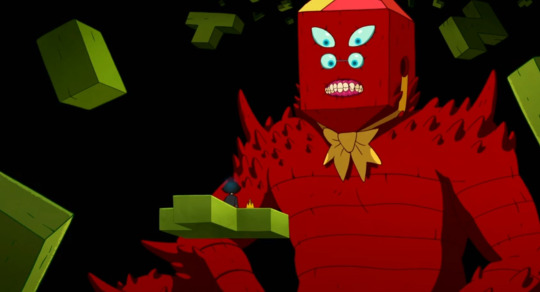
It is tough to take a plot or character motive and rework it from its original intention; if you're not good at it, then it comes off inconsistent and a disservice to its narrative/character arc. I was ready to frown if Simon and Betty hadn't gotten back together by the end of this show, but instead, I was blown away by its thoughtfulness to explore and validate why Simon and Betty had to be apart. Only when they break their obsessiveness can they both move on and change.
Also, on another note, leave it to Fionna and Cake to make a multiverse show that I really and thoroughly enjoyed, mostly because so many of these worlds had previously been established. It's LORE! How cool is that?
I've never had a strong desire to own Adventure Time (or Distant Lands) on physical media. I liked the shows, but wasn't really in love with it. Fionna and Cake though? Give it to me. Give me the bluray. I want it. I love this show. It's so damn good. Shut up and take my money!
33 notes
·
View notes
Text
thinking about the Richtofens again and their relation to the narrative.
Like you cannot deny that Ultimis Richtofen was the protagonist of early zombies. Protagonist, not hero. Important distinction. How BO1 was him literally all about him stealing narrative dominance from Samantha, who was arguably one of the most important and sympathetic character, not to mention incredibly relevant as she was the main antagonisy. Then BO2 came along and his power was contested, which was obviously the next step in the evolution of the story. Give a character power, and then have that power be tested. There we have the interesting route of Richtofen failing that test.
Of course, we know that's most likely because of Victis' reception at the time and the success of the Blundell maps, but in story is definitely represents a shift in narrative power, the person driving the plot. I think that is represented best by Monty's handling of the "Original" Maxis when he arrives in the house with Samantha, being that he wiped him from existence. Maxis was apparently strong enough to depose of Richtofen while he was in the MPD (the closest thing to god-like status we had see so far), swap out his soul (something Richtofen needed an entire meteorite and vril device to do), and ascend to Agartha. For Maxis to be erased like that means whoever did it was way more powerful than anything we've seen before. It was indicative of a shift in the narrative, both in terms of scale and character. No more Nazi experiments or Illuminati conspiracies, we're going magical multi-dimensional, boys!
But afterwards Ultimis never really got that dominance back. Going forward he was certainly a powerful personality and retained relevance (like communicating to Stulinger and serving as a parallel to Pernell), but he never got the narrative into a stranglehold like he had before.
Then we're introduced to primis. While Primis Ed never really "seized power", but he definitely drove the plot. He single-handedly kept that cycle perpetuated. He had all sorts of plots, even needing a tie-in comic to explain, which is insane. Primis Ed got his own side story. Boss bitch move. So basically complete dominance of the narrative is transferred to him, with Samantha not even contesting him, Monty being too passive, and the Shadowman busying himself by rooming with the rest of Ultimis in the Ball. But Primis has the unfortunate luck of having his story be a doomed one. No matter what he does, he will always end (and begin) the same way. And he cannot break free from that, because it's him that's causing it. It isn't until he gives up his role as leader that things get moving again. It's all very tragic and no doubt extremely frustrating for him.
And it's such a fascinating thing to pick up and look at. These guys are both such forces of nature, they make things happen, and they even succeed to varying degrees, but they will ultimately fail every time. They will try and try and try and try but never get what they want. They want to be important and powerful and respected and relevant. And for a while, their own drive and determination allows for that, but then that drives flips. It backfires on them in some way, always their own fault (Ultimis teleporting Maxis and Samantha fails to not only kill them but allows them to orchestrate his downfall, Primis knowingly locking himself and his team in a time loop that can only be broken by his own death.)
#cod zombies#edward richtofen#if this has any typos or grammar mistake its because im writing this late at night#please be gentle with me#RAAAH DONT KNOW WHAT TO TAG THIS#call of duty zombies#codz#justice long posting#like pumped out 500 words in 30 minutes#I hope this doesnt come across as pretentious as it sounds to me
40 notes
·
View notes
Text
JJK 213 💀
If 212 stabbed me in the heart, 213 has ripped out my guts and poured acid on them. Mother of fuck.
I say this with a measure of glee because I do love a narrative that emotionally eviscerates me.
Spoilers and thoughts under the cut
It’s long and rambling because I’m basically sorting my thoughts out.
The chapter felt pretty short this time, but there sure were some mindblowing developments: Confirmation that Sukuna can use Megumi’s cursed technique (and dial it up to eleven WHAT THE FUCK WAS THAT MOTHRA-NUE); Megumi’s ideal vessel status (rejoice, sukufushi shippers, it’s now canon that Sukuna always wanted to be inside Megumi! Too soon? Sorry.); the Angel’s cursed technique in its full glory (I cannot wait to see that animated...eventually); and my boy Yuuji being made into a slightly mashed donut (I joke, but I’ve been nail-biting worried about this since I read the chapter and this will continue till we see confirmation of his survival).
The vessel business
Megumi cannot catch a fucking break, can he? I’m not convinced he’s truly gone, especially because Gege did leave that breadcrump about Megumi having the potential to suppress Sukuna. But that brings me to my major issue with this recent development: if Megumi can suppress Sukuna, it implies sorcerers who can eat his fingers and not only survive but also prevent him from incarnating exist--because what are the chances it’s just Megumi and he just happened to get embroiled in all this? And despite calling him a potential cage, Sukuna doesn’t seem surprised that this is a thing Megumi can do, the way he was with how thoroughly Yuuji caged him. In fact, he seems to have settled on the formula to get into Megumi right after realizing this. All that’s fine, but it raises the question of what, exactly, makes Yuuji special.
I don’t mean it in a “why is Yuuji the MC kinda way” because (a) I love that dude to death and am following the story mostly for him and (b) Yuuji’s emotional arcs have always been a lot more compelling than his powers (or lack thereof), and I think having Sukuna out of him, possibly permanently, is an excellent development as far as his character arc is concerned (more on that later). My issue here has more to do with Kenjaku and the implied alternations they made to Yuuji in the womb: I’d say it’s a fair assumption that Yuuji’s superhuman physical capabilities and unusually powerful ability to constrain Sukuna aren’t natural, and as much as I love the “they just wanted some dick jokes,” I’m pretty sure Kenjaku didn’t conceive and deliver a kid for shits and giggles. Granted, it would kinda suit their personality; however, plot-wise, it’d be a waste.
At the moment, it looks like, while the degree of Yuuji’s ability to suppress Sukuna is unusual/unnatural, other sorcerers are capable of hosting and even caging him. So what exactly is Yuuji’s purpose, at the narrative level and in terms of Kenjaku’s plans? Did they account for Sukuna potentially breaking free, and if they did, what was the point of making a custom vessel for the guy? And is being Sukuna’s vessel all there is to Yuuji (not as a person or character but from Kenjaku’s perspective)? I have a feeling that’s not the case, but I’d need to go reread the manga to try and see why I’m so sure Kenjaku’s interested in Yuuji beyond his potential to contain Sukuna. Either way, I’m curious how the narrative will handle it. Which brings us to--
Yuuji’s survival and future arc
Gege, please.
I am fairly sure protagonist plot armor will kick in and Yuuji will survive (and honestly, him dying at this point would feel pretty damn pointless--I’m all for major character death, but if you’re killing the main lead, make it worth it, ya know?), but fucking how? He’s naturally a lot sturdier than most people, but dude’s got a fist-sized hole in his stomach and got punched through, what, three buildings? He’s got to be on his last legs there. Yuuta isn’t anywhere in the vicinity either. Lowkey hoping for Mumjaku to pop out, but that’s mostly because I have been dying for some interactions between these two since the big reveal about Yuuji’s parentage.
Assuming he survives (he better, GEGE), I’m honestly pretty excited to see how his story will progress from here. Yuuji’s whole thing since the start has been to save as many people as he can and die a good death as a martyr, and with every new trauma the narrative has piled on him, that desire has only increased to the point that it’s now a fixation. The guy seems actively suicidal after Shibuya, and the only thing keeping him from killing himself is the fact that he can’t allow himself to die meaninglessly after all the death Sukuna caused and all the people Yuuji himself failed to save. If the plot had progressed in the direction it had been taking before Sukuna used that binding vow to fuck everything to hell, Yuuji would happily have let the Angel erase him and Sukuna. And he could have called it a good, noble death because he was dying to save Gojou and eliminate a good 75% of Sukuna’s power.
And now he doesn’t have that. His death would no longer serve any greater purpose (...assuming Sukuna doesn’t somehow hop back into him, but that’s starting to look unlikely). To make a difference and help people like he so desperately wants, Yuuji will have to live. I am dying to find out how he’s going to reconcile that with his current mindsent.
Assuming he survives.
Hana and the Angel
I’ve been seeing a lot of hate for Hana after this chapter came out, regarding her decision to rush to Megumi, but honestly, it’s perfectly coherent characterization. It’s certainly a foolish decision, but it’s a completely emotion-driven, considerably panicked one that is in line with everything we’ve seen of Hana so far. She is in no way any more well adjusted than any of the main cast. Her childhood was Trauma Central: Eldritch Horror Edition, and she fixated hard on the boy who saved her despite their paths crossing for a grand total of five seconds. Megumi clearly registered her, since that’s the only way Sukuna would know to use that memory to manipulate her, but he doesn’t even acknowledge her. And there’s no indication they’ve ever interacted since; in fact, I’m rather confused on how Hana even recognized Megumi. Or whether/how she kept track of him all these years, given there’s no indication she was a sorcerer before getting Kenjaku-ed into a coma (presumably) and then hosting the Angel. Yet, she’s convinced she’s in love with him and they’re fated. Hardly a healthy coping mechanism, but it is what it is.
If Hana had a random crush on Megumi and ignored the Angel to fall for Sukuna’s trick (which seems pretty transparent to us readers, but Hana really doesn’t know the actual Megumi enough to tell that he wouldn’t be caught dead doing that pose, sweet fuck, my eyes), it would be some shit writing, but Hana isn’t acting out of infatuation or puppy love but a nearly lifelong fixation.
And it’s probably going to get her killed. I don’t see Hana getting out of that on her own; she hasn’t noticed Stretchy Headman there, and the Angel’s warnings clearly aren’t reaching her. The only way I see this moving forward without them both dying is for the Angel to take over completely--and we know she’s opposed to that, but would she make an exception with death imminent? I hope so. Because losing these characters, especially the Angel, at this juncture would just be a waste.
Now excuse me while I go scream into the void for the next two weeks.
68 notes
·
View notes